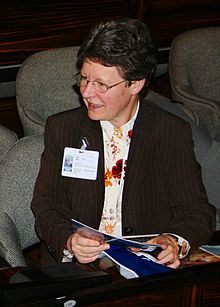Jocelyn Bell Burnell
British astrophysicist (born 1943)
Dame Susan Jocelyn Bell Burnell (born Susan Jocelyn Bell on 15 July 1943), known as Jocelyn Bell Burnell, is a British astrophysicist who, as a postgraduate student, discovered the first radio pulsars with her thesis supervisor Antony Hewish. This discovery was included in the citation when Hewish shared the Nobel Prize in Physics with Martin Ryle.

Quotes
edit- The girls got sent to the domestic science room and the boys to the science lab. ... I protested — unsuccessfully.
- There is now a thirteenth commandment "Thou shalt not make predictions in x-ray astronomy, lest the Lord thy God reveal the folly of thy ways unto all."
Beautiful Minds (2010)
edit- Scientists should never claim that something is absolutely true. You should never claim perfect, or total, or 100% because you never ever get there.
- Science doesn't always go forwards. It's a bit like doing a Rubik's cube. You sometimes have to make more of a mess with a Rubik's cube before you can get it to go right. You build up this picture of what there is and you believe it to be true and you work with this picture and you refine it but sometimes you have to abandon the picture. Sometimes you discover the picture you thought you had, that everybody thought we had, actually turns out to be wrong.
- One of the things women bring to a research project, or indeed any project, is they come from a different place, they've got a different background. Science has been named, developed, interpreted by white males for decades and women view the conventional wisdom from a slightly different angle — and that sometimes means they can clearly point to flaws in the logic, gaps in the argument, they can give a different perspective of what science is.
- By the end of my PhD I could swing a sledgehammer.
- I switched on the high speed recorder and it came blip.... blip.... blip.... blip.... blip.... Clearly the same family, the same sort of stuff and that was great, that was really sweet. It finally scotched the little green men hypothesis cos it's highly unlikely there's two lots of little green men, opposite sides of the universe, both deciding to signal to a rather inconspicuous planet earth, at the same time, using a daft technique and a rather common place frequency. It has to be some new kind of star, not seen before, and that then cleared the way for us publishing, going public!
- I find that quakerism and research science fit together very, very well. In quakerism you're expected to develop your own understanding of god from your experience in the world. There isn't a creed, there isn't a dogma. There's an understanding but nothing as formal as a dogma or creed and this idea that you develop your own understanding also means that you keep redeveloping your understanding as you get more experience, and it seems to me that's very like what goes on in "the scientific method." You have a model, of a star, its an understanding, and you develop that model in the light of experiments and observations, and so in both you're expected to evolve your thinking. Nothing is static, nothing is final, everything is held provisionally.
- Science is a quest for understanding. A search for truth seems to me to be full of pitfalls. We all have different understandings of what truth is, and we'll each believe, or we are in danger of each believing, that our truth is the one and only absolute truth, which is why I say it's full of pitfalls. I think a search for understanding is much more serviceable to humankind, and is a sufficiently ambitious goal of itself.
- You can actually do extremely well out of not getting a Nobel prize, and I have had so many prizes, and so many honours, and so many awards, that actually, I think I've had far more fun than if I'd got a Nobel Prize - which is a bit flash in the pan: You get it, you have a fun week, and it's all over, and nobody gives you anything else after that, cos they feel they can't match it.
- If we assume we've arrived: we stop searching, we stop developing.
- Looking at the universe as a whole; cosmology, the birth, life and death of the whole universe, we used to have a nice simple model. Then we had to add things like dark energy, and our nice simple picture is getting messier and messier and messier.
- I have this sense that we need to picture cosmology, the evolution of the universe in a whole new way. I'm probably not one that can achieve this new thinking but somebody will and I feel at the moment we're kind of waiting for it to happen. A bit like a pregnant pause. A bit like what happens when there's a snowfall, first snowfall of the year, when everything goes quiet and kind of waits. I feel we are in that kind of phase.